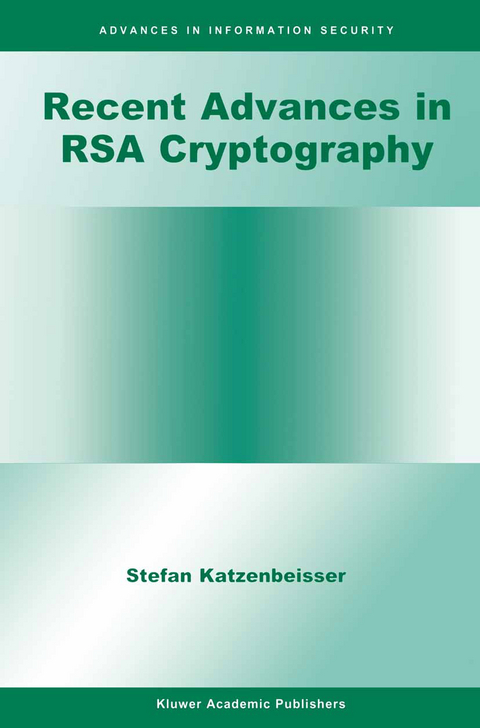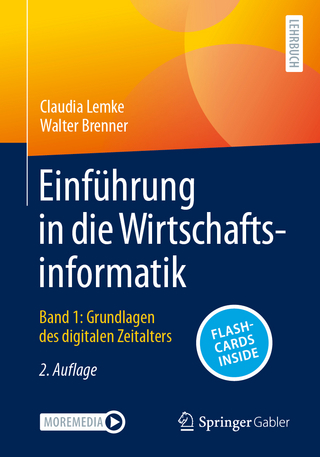
Recent Advances in RSA Cryptography
Springer-Verlag New York Inc.
978-1-4613-5550-2 (ISBN)
Recent Advances in RSA Cryptography surveys the most important achievements of the last 22 years of research in RSA cryptography. Special emphasis is laid on the description and analysis of proposed attacks against the RSA cryptosystem. The first chapters introduce the necessary background information on number theory, complexity and public key cryptography. Subsequent chapters review factorization algorithms and specific properties that make RSA attractive for cryptographers. Most recent attacks against RSA are discussed in the third part of the book (among them attacks against low-exponent RSA, Hastad's broadcast attack, and Franklin-Reiter attacks). Finally, the last chapter reviews the use of the RSA function in signature schemes.
Recent Advances in RSA Cryptography is of interest to graduate level students and researchers who will gain an insight into current research topics in the field and an overview of recent results in a unified way.
Recent Advances in RSA Cryptography is suitable as a secondary text for a graduate level course, and as a reference for researchers and practitioners in industry.
1. Mathematical Background.- 1 1 Divisibility and the residue class ring ?n.- 1.2 Polynomials.- 1.3 Euler’s totient function and ?n*.- 1.4 Polynomial congruences and systems of linear congruences.- 1.5 Quadratic residues.- 2. Computational Complexity.- 2.1 Turing machines.- 2.2 Deterministic and nondeterministic machines.- 2.3 Decision problems and complexity classes.- 2.4 Reductions, completeness and oracle computations.- 2.5 co—NP.- 2.6 Efficient computation and randomized complexity classes.- 3. Public Key Cryptography.- 3.1 Public key cryptography.- 3.2 Permutation polynomials and RSA-type cryptosystems.- 3.3 Efficient implementation of RSA.- 3.4 One-way functions.- 3.5 On the complexity of an attack against RSA.- 4. Factorization Methods.- 4.1 Trial division and Fermat factorization.- 4.2 Monte-carlo factorization.- 4.3 Factor base methods.- 4.4 The continued fraction method.- 4.5 Quadratic sieve.- 4.6 Other Factorization Methods.- 5. Properties of the RSA Cryptosystem.- 5.1 Computing the decryption exponent.- 5.2 Partial decryption.- 5.3 Cycling attacks and superencryption.- 5.4 Incorrect keys.- 5.5 Partial information on RSA and hard-core predicates.- 6. Low-Exponent RSA.- 6.1 Wiener’s attack.- 6.2 Lattice basis reduction.- 6.3 The attack of Boneh and Durfee.- 6.4 Low public exponents.- 6.5 Polynomially related messages.- 6.6 Partial key exposure.- 7. Protocol and Implementation Attacks.- 7.1 Simple protocol attacks against RSA.- 7.2 Håstad’s broadcast attack.- 7.3 Effective security of small RSA messages.- 7.4 Optimal Asymmetric Encryption.- 7.5 Faulty encryption.- 7.6 Timing attacks.- 8. RSA Signatures.- 8.1 Attacks on RSA signatures with redundancy.- 8.2 Security of hash-and-sign signatures.- 8.3 Provably secure RSA signatures.- 8.4 Undeniablesignatures.- 8.5 Threshold signatures.- References.
| Reihe/Serie | Advances in Information Security ; 3 |
|---|---|
| Zusatzinfo | XIII, 140 p. |
| Verlagsort | New York, NY |
| Sprache | englisch |
| Maße | 155 x 235 mm |
| Themenwelt | Mathematik / Informatik ► Informatik ► Netzwerke |
| Informatik ► Office Programme ► Outlook | |
| Informatik ► Theorie / Studium ► Algorithmen | |
| Informatik ► Theorie / Studium ► Kryptologie | |
| Medizin / Pharmazie | |
| ISBN-10 | 1-4613-5550-8 / 1461355508 |
| ISBN-13 | 978-1-4613-5550-2 / 9781461355502 |
| Zustand | Neuware |
| Informationen gemäß Produktsicherheitsverordnung (GPSR) | |
| Haben Sie eine Frage zum Produkt? |
aus dem Bereich


